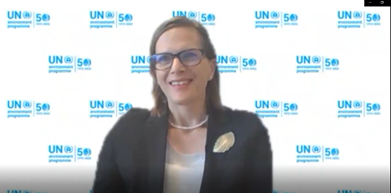Blue talks: Managing, Protecting, Conserving and Restoring Marine and Coastal Ecosystems
Discussion details

Blue talks: Managing, Protecting, Conserving and Restoring
Marine and Coastal Ecosystems.
Session: Partnerships and Cooperation between governments and organizations.
On Friday, June 3 2022, Veronika Hunt Safrankova, Head of the UN Environment Programme (UNEP) Brussels Office, was invited to speak at the Blue Talks: Bridges to Lisbon: The 2022 United Nations Oceans Conference, Hosted by The Embassy of Portugal to the Kingdom of Belgium. The theme of the Blue Talks Hybrid Webinar was ““Managing, Protecting, Conserving and Restraining Marine Coastal Ecosystems”. She spoke in a panel discussion alongside, Jacob T. Kaimenyi, Ambassador of Kenya to Belgium, Rui Tereno, Ambassador of Portugal to Belgium and, José Maria Costa – Portuguese Secretary of State for Maritime Affairs.
Leading up to the 2022 United Nations Ocean Conference, to be held in Lisbon from 27th June to 1st July, the Embassy of Portugal in Brussels organised a “Blue Talks” event, which intends to trigger the debate and interest in the theme of Oceans. The Blue talks mainly focused on Marine Protected Areas (MPAs) and how they are used to mitigate the negative effects of human activities in the maritime sphere. The participants also addressed the importance of establishing more partnerships and cooperation between governments and organizations to create wider connected networks of MPA’s.
Ms Hunt Safrankova started by recalling why protecting marine and coastal ecosystems matters so much. “Healthy oceans are vital. They hold a crucial role as we live in a blue planet in which oceans and seas represent over 70% of Planet Earth’s surface coverage. Oceans are also key as they generate most of the oxygen that we breathe, regulate our climate, provide protection from natural disasters, and serve as the foundation for much of the world’s economy.”
She then spoke about the partnerships between all stakeholders which is essential, and highlighted the plastic ban milestone in United Nations Environment Assembly (UNEA) 5.2 (in February 2022), a historical move and an illustration of the importance of global collaboration. “Capacity-building, the facilitation of access to technology and scientific cooperation are very important,” she explained. “ Such collaborations are in line with the science-policy interface that UNEP is promoting so that scientific data can be easily accessible to governments and citizens.” Citing as example UNEP’s World Environment Situation Room (WESR) platform and other relevant partner portals to display data and data analytics. The latter are key, she said, to manage and protect the marine ecosystems’ valuable resources. “Likewise, comprehensive engagement, including partnering with coastal communities, particularly in Small Island Developing States (SIDS) and Developing Countries, is essential to achieving data-driven impact and change for the benefit of marine resources and sustainable development.”

She concluded with, “We have tools, we have data, but we must use them and ensure there is rapid action which is indeed the key topic for the UN Ocean Conference. Governments and organisations hold a key role in protecting marine and coastal ecosystems by partnering and working together and UNEP is keen on promoting such activities via multilateral processes in a bid to achieve objective 14.”
Log in with your EU Login account to post or comment on the platform.